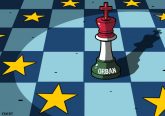Moldova is due to hold presidential elections on 30 October. Alexandru Damian examines what the implications of the election may be for Romania, which has previously expressed support for the current Moldovan government. He suggests that with the government’s preferred candidate facing a challenge to make the second round of the contest, supporting Maia Sandu from the Action and Solidarity party may represent the best option for promoting reform in the country.
Shaken by political and economic instability, and divided between pro-Russian and pro-European positions, Moldova is presently awaiting critical presidential elections on 30 October which will help shape the country’s future trajectory. But against this backdrop, Romania’s engagement with the country over the last year could well be described as a missed opportunity. With Moldova remaining a low priority on the agenda in Brussels, there has been clear scope for Romania to step in and adopt a leadership role in the EU’s problematic Eastern Neighbourhood. This has so far yet to transpire.
Romania’s foreign policy agenda in the country is, at this moment, under severe pressure. Firstly, Bucharest has just released the first instalment of 60 million euros as part of a financial assistance agreement with Moldova, offering de facto support for the current governing coalition in Chisinau, which is oriented around the Democratic Party and its controversial backer, Vladimir Plahotniuc. Secondly, Romania has been stubborn in ignoring several new political movements in Moldova, especially the Dignity and Truth Platform, and the Action and Solidarity Party, who both articulate a pro-European reform agenda.
During the election campaign, decision makers from Bucharest have backed the current governing coalition, a move that, in theory at least, could have significant implications for relations between the two countries if Igor Dodon, the leader of Moldova’s opposition Socialist Party and the pre-election favourite, manages to win the contest on 30 October. Dodon’s party is generally described as being ‘pro-Russian’ in contrast to the governing coalition – which at least in theory can be described as being “pro European”.
Nevertheless, despite Romania’s carelessness, a last-minute alliance between Maia Sandu of the Action and Solidarity Party, and Andrei Nastase of the Dignity and Truth Platform, could keep the country on a pro-European track. Nastase dropped out of the contest on 15 October and agreed to support Sandu, with this development being well received by both the electorate and other European capitals. The most likely result is that no single candidate will win in the first round of voting and a second round runoff will be held between Sandu and Dodon. The candidate supported by the Democratic Party, Marian Lupu, is unlikely to enter the second round. This would afford Romania an opportunity to correct its initial negligence in relation to the election and endorse Sandu.
Romania’s decision to back the government in Moldova is particularly perilous as the ruling coalition suffers from very low levels of popularity, independently of the presidential election. In the context of the election itself, several media outlets have consistently emphasised links between Lupu, Dodon and Plahotniuc, implying that if either Lupu or Dodon wins, it will remain business as usual and another window of opportunity will have been missed for both Romania and the EU to advocate real change in the country.
While Moldova’s political problems have remained off the agenda in Brussels, Romania has had its window of opportunity. As Moldova was close to financial collapse, following the so called “theft of the century” (the disappearance of around $1 billion through the country’s three main banks), Bucharest could have used its leverage to advance a reform agenda in Chisinau.
In fact, this was indeed attempted with the conditional release of a first payment: the conditions included completing an analysis of vulnerabilities in the banking system as well as making them transparent; auditing banks; bringing the legislative anti-corruption framework up to date and evaluating anti-corruption institutions. However, none of these conditions were met. From the list proposed by Bucharest, only a staff agreement was fulfilled. The other requirements were either too vague or simply impossible for Moldova to carry out in such a short time-frame (i.e. the evaluation of the banking system and anticorruption institutions).
And the question which remains is why Romania continues to put all of its eggs in one basket by maintaining tacit support for the current government, with presidential elections on the horizon which could act as a game changer for relations between the two countries. The current government is neither more progressive nor more pro-European than the other governments that have held office over the last 26 years. What’s more, in comparison to previous governments, it suffers from a substantial problem in the shape of Plahotniuc, who suffers from the lowest levels of popular support of any political figure in the country, but nevertheless maintains large levels of influence in the media and has a close relationship with both decision-makers in Bucharest and the Socialist Party in Chisinau.
The EU and Romania would both like to avoid Moldova turning into another island of instability in Europe’s neighbourhood and this perhaps explains their desire to support the most powerful political parties and leaders within the country, even if this comes at the expense of citizens. Dodon has adopted a campaign slogan emphasising that Romania ‘will not be our master’ and has advocated Eurasian integration. But on the other hand, the status quo may not be affected to the degree anticipated if Dodon does emerge as the winner of the election.
Granted, some change will occur if this happens, but it is perhaps telling that media sources linked to Plahotniuc have directed a negative campaign against Andrei Năstase and Maia Sandu, while largely ignoring Dodon, despite the latter theoretically being the main opponent of the government. This is rather easy to explain as the movement formed around Năstase and Sandu is the only one that is not, directly or indirectly, under his influence. Unfortunately for Bucharest, Romania has also been slow to cultivate influence with these new movements.
Moldova’s European path is not irreversible and Romania’s support for the government may ultimately derail its foreign policy agenda. But this damage can still be avoided if Bucharest lives up to expectations and acts as Moldova’s main advocate for European integration. If, as expected, Sandu and Dodon face off in the second round of the presidential elections, another opportunity will be available for Romania to support a clear reform agenda by backing Sandu, but only time will tell whether the country is willing to do so.
This post was first published at the LSE EUROPP blog.







